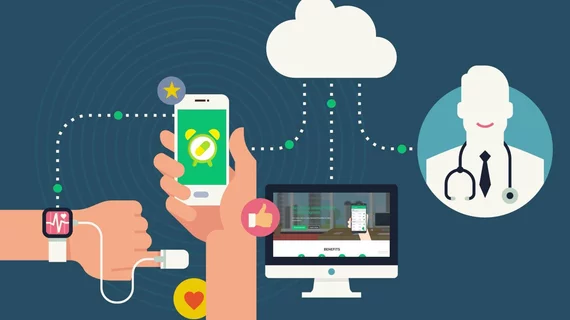These health systems have the biggest digital health portfolios
U.S. health systems are increasingly leveraging digital health to conduct their operations, but how health systems are using digital health in their strategies can vary widely.
That’s according to a new report from Finn Partners and Galen Growth that examined the growing digital health portfolios of U.S. health systems, hospitals and clinics. Digital health covers a wide range of technologies and applications that enable remote patient monitoring, physician-to-physician expertise remotely, remote care and use of data to make informed decisions about patient care.
In the COVID-19 pandemic, digital health also offers people the ability to access healthcare right from their home, alleviating many of the issues with accessibility in remote or rural areas, as well as for those who can’t take time away from work or have mobility issues.
Health systems in the United States are encompassing more and more of the digital health space, with 31% of all global partnerships with digital health ventures founded in the U.S. built within hospitals and health systems in 2022. Globally, there have been more than 1,400 partnerships between digital health ventures and U.S. health systems since 2012, according to Galen Growth. However, the spread between health systems is big, with a 2.1x difference in the digital health portfolio size between the most active health systems and the largest health systems.
Here are some of the U.S. health systems with the largest digital health portfolios and the number of partnerships, according to the report:
- Mayo Clinic (77)
- Mount Sinai Health System (34)
- Cleveland Clinic (32)
- Boston Children’s Hospital (24)
- Memorial Sloan Kettering Cancer Center (23)
The ranking comes at a time when upwards of 50% of health systems are reputed to be struggling financially due to the tight labor market. As health systems face ongoing challenges, digital health will continue to play a crucial role in their success.
“We are likely to see more partnerships between health systems and digital health innovators in the months and years to come because close relationships between these groups are vital as we seek ways to leverage technology to enhance patient care and outcomes and improve both providers’ and patients’ experiences,” Aaron Lewis, executive vice president, growth and integrated solutions of Lifepoint Health, said in the report. “The reality is that health systems and digital health innovators can sometimes have very different views on the challenges and opportunities that exist in healthcare. Working with health systems allows innovators to understand the realities of care delivery and working with innovators allows health systems a view into the possibilities of new technology. Collaboration is how we make a difference faster.”

